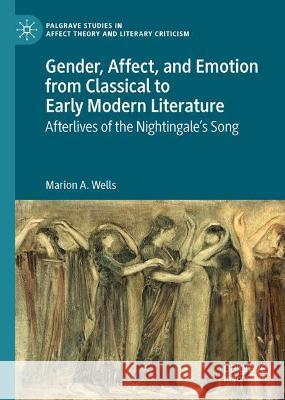Gender, Affect, and Emotion from Classical to Early Modern Literature: Afterlives of the Nightingale’s Song » książka
Gender, Affect, and Emotion from Classical to Early Modern Literature: Afterlives of the Nightingale’s Song
ISBN-13: 9783031277207 / Angielski
Drawing both on historical accounts of the emotions and on contemporary affect theory, this book explores the intersection of social constructions of sex and gender with the development of norms for emotive speech in literary texts from the classical to the early modern periods. More specifically, the book argues that the influential Stoic theory of the prepassions (as distinct from the passions proper) resonates richly with recent work on affect, emphasizing in similar ways the role of embodied feelings that may exceed available linguistic norms as well as challenging gendered emotion scripts. From the tragic Stoicism of Virgil’sAeneidto Chaucer’s Stoic-Petrarchan Griselda and the Stoic-inflected attitudes reflected in the work of seventeenth century poet Mary Carey, the Stoic view of the emotions as test-cases for a moralized conception of masculine coherence conflicts with a fluid affective model of feeling that challenges the ideal of emotional self-containment.
Drawing both on historical accounts of the emotions and on contemporary affect theory, this book explores the intersection of social constructions of sex and gender with the development of norms for emotive speech in literary texts from the classical to the early modern periods. More specifically, the book argues that the influential Stoic theory of the prepassions (as distinct from the passions proper) resonates richly with recent work on affect, emphasizing in similar ways the role of embodied feelings that may exceed available linguistic norms as well as challenging gendered emotion scripts. From the tragic Stoicism of Virgil’s Aeneid to Chaucer’s Stoic-Petrarchan Griselda and the Stoic-inflected attitudes reflected in the work of seventeenth century poet Mary Carey, the Stoic view of the emotions as test-cases for a moralized conception of masculine coherence conflicts with a fluid affective model of feeling that challenges the ideal of emotional self-containment.











